
Related
Guests
- Douglas RocheCanadian ambassador for disarmament.
- David Cortrightpresident of the Fourth Freedom Forum.
Speculation of the inclusion of Russia into NATO brings about discussion of an organization that alludes to the purpose of the U.N. The OSCE is also discussed, and a combined NATO-OSCE organization is proposed, instead of the exclusion of Russia with expansion of NATO. Attitudes of Americans are discussed with regard to the expansion and the need for more debate about the “Helms factor,” a factor centered on the subset of the American population that drives the expansion policy. Senators Joseph Biden and Jesse Helms are discussed as leaders of the foreign relations committees that endorse this expansion regardless of the lack of debate in the media, and consequently the American public, concerning the legislation.
Transcript
AMY GOODMAN: And you’re listening to Democracy Now! I’m Amy Goodman, with Juan González.
The Cold War is over, and the former Soviet Union has collapsed. But the demilitarization of Western Europe has not happened. Instead, officials in Washington and in many European capitals now want to enlarge the U.S., Canadian and Western European military alliance known as the North American Treaty Organization, or NATO. Formed some 50 years ago to ensure Western European security for threats from both foreign and domestic, NATO is slated to decide this summer whether to accept Hungary, the Czech Republic and Poland into the military alliance.
Joining to discuss the question of NATO enlargement are two guests. We’re joined by David Cortright, the president of the Fourth Freedom Forum and chair of the board of the Peace Action Education Fund. He’ll soon be leading a delegation of Americans to NATO capitals to exchange views on NATO expansion. We’re also joined by Ambassador Douglas Roche, the former Canadian ambassador for disarmament and presently the representative of the Holy See for Disarmament at the United Nations.
Welcome to Democracy Now!
DOUGLAS ROCHE: Thank you.
DAVID CORTRIGHT: Good morning, Amy.
AMY GOODMAN: Well, why don’t we begin with you, Ambassador Roche? You’re here in New York for the review conference on the Nonproliferation Treaty. Now, how does that tie in to NATO?
DOUGLAS ROCHE: I think it’s a very interesting tie-in. The whole question of the future of nuclear weapons is now at stake. The International Court of Justice last year ruled that the use or threat of use of nuclear weapons would generally contravene all aspects of humanitarian and international law. NATO is turning its back on the International Court of Justice, the highest legal authority in the world. NATO is saying that nuclear weapons continue to be essential.
And NATO is expanding, thus giving real cause for concern to the government of the Russian Federation. If Russia maintains its concern and fails to ratify the START II agreement, which is the agreement signed by — between the United States and Russia to decelerate nuclear weapons down to levels of about 3,500 each, that will set back the cause of the extension of peace that the end of the Cold War represents. George Kennan, the great American diplomat and who knows a lot about the whole subject of Europe and so on, has said that the expansion of NATO could be the most fateful error that the United States has made since the end of the Cold War.
And I agree with Mr. Kennan. I think that it has very serious implications. It’s continuing to bring militarism as the centerpiece of international activities in Europe, rather than the extension of democracy and economic growth and social development that is represented by another organization that we don’t hear enough about, that’s called the Organization for Security and Co-operation in Europe, which is truly a pan-European security instrument. NATO, dominated by the United States and continuing to possess nuclear weapons, that are also held by the United Kingdom and France, I think, is a serious threat to the development of peaceful conditions in the post-Cold War era.
JUAN GONZÁLEZ: Well, what is driving — David Cortright, what is driving this continued push to expand NATO, to maintain a military alliance in an age when there are no credible — no credible opponents with which that alliance would have to contend?
DAVID CORTRIGHT: In a word, militarism. It’s a sad commentary on our Western civilization, so-called, that the instrument that we are using to try to integrate Europe and unify Europe is not political or economic, cultural, but military. And as Douglas Roche says, it’s a very dangerous, foolhardy policy.
I worry — I’m deeply troubled that we may be now living through the era of the second Cold War beginning, kind of present at the creation, to use the words of Dean Acheson from the 1940s. We may be living through that period now, where we are pursuing this policy of expanding an alliance that’s dependent on nuclear weapons, that is a military force, right up to the borders of Russia, at a time when Russia is trying, in its feeble way, to become more democratic, to reform, to be more open to the West. And yet we’re slapping them in the face, essentially. We’re rebuffing the tender stirrings of democracy in Russia and giving an issue to the hard-liners, to the militarists in Russia, creating new divisions in Europe, possibly sparking another Cold War.
It’s a reflection, as I say, of militarism, and it’s an issue that we have not sufficiently grasped in this country. It’s been conducted largely behind the backs of the public without much debate. We need to be concerned about this. We need to mobilize a voice of conscience to argue against this. Let’s say stop. Let’s reconsider and think about other ways in which we can create a more unified, democratic Europe.
AMY GOODMAN: Does the U.S. Secretary of State Madeleine Albright have a personal stake in this, being that she comes from Czechoslovakia, Ambassador Roche?
DOUGLAS ROCHE: Well, I think she may. I personally doubt that Ms. Albright’s personal background is the instrumental factor in United States foreign policy.
I think that the government of the United States has decided that this is a means by which the power of the United States in Europe can be maintained. We have also to recognize this is not being imposed on the three countries that you named that are standing in line to be admitted to the NATO club — the Czech Republic, Poland and Hungary. They’re eager to get in. But the reason they’re eager is because they see NATO as a ticket to Western commerce.
And I think that the — you asked earlier what’s really driving this, and I think one of the things that’s driving it is the military-industrial complex. The amount of arms and regeneration of military equipment in the Eastern European countries is going to be a hot new market, because they’re certainly not going to be dependent on Russian-made equipment or the old Soviet Union equipment that is in deleterious condition now. So, there is a greed, power, money factor at the base of this whole question of expansion.
And David Cortright is absolutely right: There has not been sufficient public debate. They haven’t — Congress hasn’t given its attention. The media haven’t given their attention. And yet it’s a profound move that we’re about to take. And I think it’s fascinating that we’re here discussing this on a show called Democracy Now! For heaven’s sakes, could we not have some democracy about how we’re going to conduct ourselves in the post-Cold War era?
JUAN GONZÁLEZ: Well, Ambassador, it’s interesting that you mention that, because when David Cortright was saying before militarism, I don’t perceive an increasing militarist sentiment among the American public, but obviously some section of American society is driving this. It reminds me very much — I’ve talked quite often about the telecommunications bill, which was another — the deregulation of the telecommunications industry in the United States, another what I call stealth legislation, which was, in essence, pushed through Congress without very much public debate, without very many hearings, but yet it was something very near and dear to the mega media industry in America, so that this would seem to me precisely what you’re saying, that there’s a lot of corporations that stand to make a lot of money from expansion of and replacement of military supplies in Eastern Europe. And certainly, they must be the ones that are pushing our political officials and our military officials, too many of whom often end up, when they retire, working for the weapons industry, to make this seem as if it’s in the interest of the United States. But what about Russia? Why would — I mean, everything I have heard, Russia is practically in bankrupt state. They can’t pay their — very many of their people. The government can’t pay them their regular salaries. Why should Russia be concerned about what is happening with the expansion of NATO?
DAVID CORTRIGHT: Well, if you look at the history of Russia, they’ve always been concerned about their sense of isolation. There is paranoia in Russian political culture, certainly. And they have to be worried that the Western military alliance, which we must remember was created as an anti-Russian, anti-Soviet structure, is now coming right up to their borders. Now, of course, at the Helsinki meeting, President Clinton told President Yeltsin, “Don’t worry, Boris. This is not aimed at you.” But, of course, why do the Poles and the Baltic states and the others want to join? Precisely to get protection against Russia. So it can’t be both things. It’s one or the other. And the Russians perceive it as directed against them. That’s what NATO always has been. And so, I think they are right to be concerned.
And this opinion in Russia goes across the political spectrum. It’s not just the Zhirinovsky hard-line nationalists. It’s some of the very best reform-minded people, who are equally concerned about this alliance coming right up to the Russian borders. I ask the question: If there is to be some expanded security structure in Europe, why not include Russia? Russia wants to be democratic. It’s trying in its own way to be a more democratic and open society. And if we’re going to include Russia, then, as Ambassador Roche says, why not integrate NATO into this Organization for Security and Co-operation in Europe, the OSCE?
AMY GOODMAN: What from? Aliens? Who are we protecting? Who would everyone be protected from?
DAVID CORTRIGHT: Well, then you — that’s a good question. Then, what is the mission? Well, the mission can’t be deterrence anymore. To whom are we — whom are we deterring? It really ought to be a mutual reassurance.
JUAN GONZÁLEZ: [inaudible] Pakistan is growing a nuclear arsenal.
DAVID CORTRIGHT: Well, peacekeeping, conflict prevention, those are real missions. I mean, NATO is actually doing something reasonably good in Bosnia in keeping the ceasefire. OSCE has attempted to prevent conflicts in the Caucasus and other regions of conflict in Central and Eastern Europe. There is a need for conflict prevention and peacekeeping. And a combined OSCE-NATO-type operation might make sense. But to go just with NATO as a military-nuclear alliance up against Russia and excluding Russia, I think, is a formula for disaster.
JUAN GONZÁLEZ: So, why would people within our government oppose the idea of including Russia?
DOUGLAS ROCHE: Well, I think —
AMY GOODMAN: Ambassador Roche?
DOUGLAS ROCHE: — that there are two things that should be focused on now. It seems to me that the U.S. policy on this is almost now carved in stone, that they are going to proceed. Maybe there will be a review, but I kind of doubt it. David Cortright says bring in Russia. I thoroughly agree with that. If they’re determined to expand NATO, then bring in Russia.
The second thing that needs to be done is get nuclear weapons out of NATO. Why does NATO need nuclear weapons? Against whom would they be used? And this brings us back to the World Court decision of last year that says that nuclear weapons contravene all aspects of humanitarian law. Perhaps we could get a review of NATO’s policies on nuclear weapons. That is what we have called for in a submission that has been made to the Canadian Parliament as a NATO country. If NATO is determined to expand, then get nuclear weapons out of NATO. There is no justification whatsoever for the maintenance of nuclear weapons. And furthermore, it is carrying nuclear weapons forward into the 21st century that is itself going to act as a destabilizing factor on world peace.
DAVID CORTRIGHT: Yeah, this is an important issue. There still are hundreds of these so-called tactical nuclear weapons in NATO, in the U.K. and some of the continental states. And this whole structure will be part of NATO. NATO has said explicitly that the new member states — Poland, Czech Republic and others — must accept the nuclear deterrence doctrine, which is at the heart of NATO. So, whatever assurances are given to Yeltsin, the fact is that this structure, with its nuclear deterrent component, will go right up to the borders of Russia.
DOUGLAS ROCHE: I’d like to come back for one second to the distinction made, we were suggesting earlier, about a sector or a section of American society that favors extended militarism, but not the whole society. The American people are quite divided on this question. And moreover, there is within the United States strong movements to extend peace and reduce the dependence on militarism. So, I think that we need to examine, through having a debate in the United States particularly, why it is that a section of the government — as a non-American, I feel rather hesitant to make any critical comments while I’m present in your country, but I think that it’s — we have to look at what I would call the Helms factor. It isn’t the personality of Jesse Helms. It’s the ideas that he’s representing, that he’s sort of flagging. And so, it’s that element that has to be addressed. Why are they maintaining militarism and a hard line in the light of the possibilities for building the conditions for peace that the end of the Cold War represented?
AMY GOODMAN: Well, David Cortright, you’re president of the Fourth Freedom Forum, and you’re also going to be leading this delegation of Americans to NATO capitals to exchange views on NATO expansion. Why? Is this a done deal at this point? I mean, while this, the summit where they’re going to finally decide on whether to include these countries in NATO, hasn’t taken place yet — it will take place in the summer — is there any way that people can influence the U.S. decision?
DAVID CORTRIGHT: Absolutely. It’s likely that this invitation at the NATO summit will take place in July. It doesn’t seem possible that that can be stopped now. But this decision then must be ratified by the national legislatures of every NATO country, including the U.S. Congress. And, in fact, by the way, the White House is planning to really ram this thing through. They’re scheduling a vote on the ratification of NATO expansion next year, about this time next summer. So, it’s not a done deal in the sense that this will have to come before our Congress. And we must get this debate going in the next year so that some reason and sanity can be brought to it.
JUAN GONZÁLEZ: Now, will this be, before Congress, let’s say, with the Senate as a treaty? Or —
DAVID CORTRIGHT: The Senate. It will be a treaty. It will be a formal treaty obligation. Thankfully, when NATO was first instituted, it was stipulated that any expansion or change would be subject to treaty ratification. So, there is a possibility.
JUAN GONZÁLEZ: And for our listeners who may be interested in writing or calling their senators one way or another, could you tell us who are some of the leading proponents of this expansion and who are some of the leading senators who oppose this policy?
DAVID CORTRIGHT: Well, right now in the Senate, there have been some of the arms control groups. The Council for a Livable World and others are starting to poll members of the Senate. And there’s very few who have even paid much attention to it. By and large, the attitude in Washington is, “Well, the White House wants this. NATO seems to be in favor. So, I guess we’ll go along.” So there’s going to be a very difficult and long effort ahead to make the educational efforts to show the flaws in this plan. Senator Biden, Senator Jesse Helms, these are among the leaders in the foreign relations committees who have so far gone along with this proposal. It’s, frankly, been difficult to find any senators who are opposed. Interestingly —
AMY GOODMAN: You know, I think that’s why — I think that’s why I see very little debate on this in the media. I’ve seen a lot of discussion of NATO, but media generally follows the agenda set by Washington. When the Democrats and the Republicans agree, that’s what you’re just getting — commentators talking about why these countries should be included in NATO. I have rarely heard — even though the majority of foreign policy experts are against this, I have rarely heard people like you speaking in the mainstream media.
JUAN GONZÁLEZ: But there have been instances. For instance, the NAFTA debate, which initially had bipartisan support by all the presidents and all the former presidents and the Senate, but then a groundswell of opposition developed among the environmental and labor groups, and a major national debate was forced on the issue at the end. So it is possible, even though something is already on track, if there is a groundswell of public concern to force a debate on the country.
DAVID CORTRIGHT: Exactly right. And this administration, we’ve seen, goes with the political winds. If we can create a forceful wind of public opinion against this, I think you could have a chance of trying to hold it back, at least stop it at the first three rather than continuing this expansion.
AMY GOODMAN: Ambassador Roche or David Cortright, do either of you have a phone number you’d like to leave our listeners with, if they want to get more information on the whole NATO discussion?
DAVID CORTRIGHT: Yeah, they can call our office. We have an 800 number, 1-800-233-6786. That’s —
AMY GOODMAN: And this the Fourth Freedom Forum?
DAVID CORTRIGHT: — Fourth Freedom.
AMY GOODMAN: One more time, that number?
DAVID CORTRIGHT: 1-800-233-6786.
AMY GOODMAN: Well, I want to thank you both very much for joining us, David Cortright, Fourth Freedom Forum president, as well as Ambassador Douglas Roche, former Canadian ambassador for disarmament and presently the representative of the Holy See for Disarmament at the United Nations.
You’re listening to Democracy Now! We’ll be back in 60 seconds.

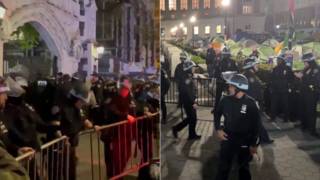
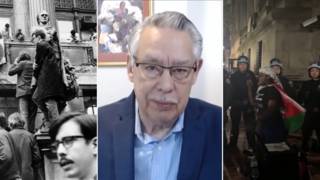
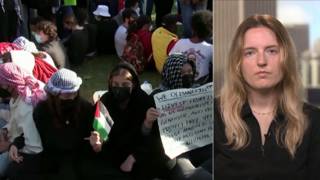
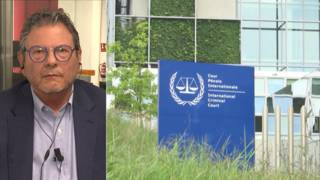






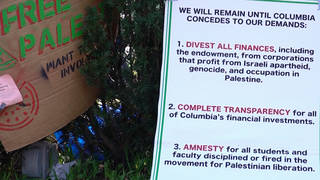
Media Options